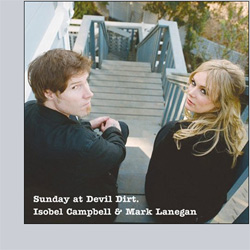 by: Daniel Johnson
by: Daniel Johnson
There's a lot of music at KUCI. Here's a selection that you may have missed from 2008 that is certainly still worth checking out...
As a joint effort by Isobel Campbell and Mark Lanegan, “Sunday at Devil Dirt” is a haunting and mysterious album, one that’s drastically different from the indie pop of Belle & Sebastian and the grunge sound of the Screaming Trees (the former bands of Campbell and Lanegan, respectively.) Instead, the release is more reminiscent of Lanegan’s work with the Twilight Singers, featuring down-tempo songs and a heavy emphasis on deep, gruff vocals. That’s not to say Campbell doesn’t have a place on the album, even if Lanegan’s voice usually takes center stage. After all, Campbell wrote every song on “Sunday at Devil Dirt” except the third track, “Salvation.”
Campbell puts forth her soft voice in “Come On Over (Turn Me On),” though it barely comes through once Lanegan’s voice reappears. It’s ironic that, in a duo, Campbell’s musical performance is showcased less than it was with the large ensemble of Belle & Sebastian. Still, it’s encouraging that her vocals blend so well with Lanegan’s, more so than they did with Stuart Murdoch’s in Belle & Sebastian.
Campbell is also marginalized because tracks such as “Come On Over (Turn Me On)” sound more like filler songs than standout pieces. The album’s second song, “The Raven” (a reworking of the Edgar Allen Poe classic), is more worthy of repeat listening. At just under five minutes, “The Raven” is the second longest track on the release. Overall, the short songs keep the album’s flow from becoming too tedious and make it more radio-friendly. The one exception is the six-minute-plus “Back Burner,” which comes off as repetitive despite some impressive piano work. At the same time, it’s difficult to blame Campbell and Lanegan for trying to spread their indie rock wings.
Since Campbell sings only one notable track by herself, the nostalgic “Shot Gun Blues,” the strengths and the weaknesses of the album come to rest on Lanegan’s voice and Campbell’s songwriting. Lanegan’s gruff voice creates a complex mood and depth of feeling, though at times it does sound too downtrodden. The album is definitely worth listening to, as long as the listener doesn’t expect to feel too optimistic after the release’s closer “Sally Don’t You Cry.”
Share
|
|

